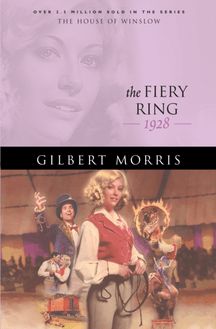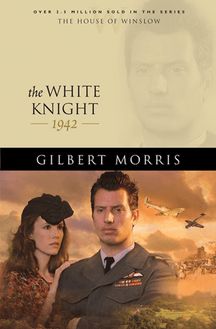Silver Star (House of Winslow Book #20) , livre ebook
205
pages
English
Ebooks
2006
Vous pourrez modifier la taille du texte de cet ouvrage
Obtenez un accès à la bibliothèque pour le consulter en ligne En savoir plus
Découvre YouScribe et accède à tout notre catalogue !
Découvre YouScribe et accède à tout notre catalogue !
205
pages
English
Ebooks
2006
Vous pourrez modifier la taille du texte de cet ouvrage
Obtenez un accès à la bibliothèque pour le consulter en ligne En savoir plus
Publié par
Date de parution
01 février 2006
Nombre de lectures
0
EAN13
9781441270450
Langue
English
Poids de l'ouvrage
1 Mo
Publié par
Date de parution
01 février 2006
EAN13
9781441270450
Langue
English
Poids de l'ouvrage
1 Mo
© 1997 by Gilbert Morris
2006 edition
Published by Bethany House Publishers
11400 Hampshire Avenue South
Bloomington, Minnesota 55438
www.bethanyhouse.com
Bethany House Publishers is a division of
Baker Publishing Group, Grand Rapids, Michigan
www.bakerpublishinggroup.com
Ebook edition created 2011
All rights reserved. No part of this publication may be reproduced, stored in a retrieval system, or transmitted in any form or by any means electronic, mechanical, photocopying, recording, or otherwise without the prior written permission of the publisher and copyright owners. The only exception is brief quotations in printed reviews.
ISBN 978-1-4412-7045-0
Library of Congress Cataloging-in-Publication Data is on file at the Library of Congress, Washington, D.C.
Cover illustration by Dan Thornberg
Cover design by Josh Madison
To Bruce and Kathy Tippit
God has blessed Johnnie and me with many fine friends.
You two have been a blessing to us both!
Thanks for the memory
CONTENTS
Cover
Title Page
Copyright Page
Dedication
PART ONE
Going West
1. “I Don’t Need a Man!”
2. Homecoming
3. A New Sort of Minister
4. Bummers
5. A Bit of Courage
6. The Three Musketeers
PART TWO
Faith Temple
7. A Small Town in Kansas
8. A Preacher Comes to Town
9. A New Year for the Winslows
10. A Touch of Loneliness
11. Amelia’s Birthday Party
12. A Kiss in the Dark
PART THREE
A Fork in the Road
13. Jolie Fails the Test
14. French Perfume
15. A Day With Nolan Cole
16. A Little Peace of Mind
17. “You’re Not My Father!”
18. A Minor Accident
PART FOUR
Victors
19. The End of It
20. Nero
21. Bitter Fruit
22. Ill Tidings
23. A Change of Heart
24. A New Time
About the Author
CHAPTER ONE
“I Don’t Need a Man!”
The Great White Way in New York City had enjoyed an extraordinary year. The country was enjoying a financial boom, and New Yorkers were anxious to spend their cash. The year 1904 had played itself out to the month of June, and three major plays dominated Broadway. The most successful of all was James M. Barrie’s Peter Pan, starring Maude Adams. Her youthful beauty alone would have made her successful, but she was a fine dramatic actress as well and a welcome addition to the Great White Way. The play had opened in the Knickerbocker Theater almost at the same time that George M. Cohan’s Little Johnnie Jones opened at the Liberty. In between these two theaters was the Belasko Theater not as large as the other two but known for the fine quality of its productions. The marquee outside proclaimed in large script, ALL THE FAIR YOUNG LADIES, starring Priscilla Winslow.
A derelict passing by the theater moved toward the door, but his way was blocked by a truculent attendant who put his hand on the man’s thin chest, saying, “Move along, buddy! No handouts here! Don’t linger now!” As the derelict stumbled off, the doorman watched him and muttered, “Too bad. Too bad.” Wheeling briskly around, he stepped inside the theater, stopping at the doors that separated the lobby from the auditorium, then shook his head. “They’re still applauding. That must be at least six or seven curtain calls for Miss Priscilla.” He opened the door cautiously and peeked in, letting the roar of the standing ovation spill into the quiet lobby. Shouts of “Bravo!” and “Well done!” echoed throughout the theater.
Up on the stage Priscilla Winslow gracefully curtsied to the audience, cradling in one arm an enormous bouquet of crimson long-stemmed roses. Her beautiful figure was enhanced by the lavender off-the-shoulder silk dress with pearls draped over each shoulder, the low neckline adorned with a pink silk rose-and-bow trim, the narrow waistline cinched tightly with a belt. Long, flowing sleeves fell to just below the elbow, and the narrow-paneled skirt was lavishly decorated at the hem with ribbon, lace, and pearls draped between small bows. The effect was stunning and made her appear much taller than she really was. Her honey-colored hair was elegantly arranged and interwoven with metallic braids. Her large blue-green eyes sparkled in the stage lights, and there was a delicate beauty in the curve of her lips as well as in the lustrous quality of her complexion. She curtsied one last time and motioned for quiet. When the thunderous applause died down, she said in a clear voice that carried to the very last rows of the theater, even to the doorman who stood listening, “I thank you from the bottom of my heart for your kindness. None of you will ever know how much it means to me to have you come for my performances. I would be less than honest if I said that I did not enjoy the money and the small amount of fame that has found me, but I will tell you that my greatest pleasure comes not from these but from the response that you have so graciously given me. . . .”
She continued to speak, and the audience remained silent, captivated by the simple honesty and vibrancy that emanated from her. It was for this reason that many of them had come again and again to see her perform in what the critics viewed as “a very average sort of play.” As she went on, the hush continued, and finally she said, “As you may know, this is my farewell performance.” She smiled at the murmur of protest that rippled through the audience. “I can do no more than say it has been the greatest joy of my life to bring you some degree of pleasure, and I would hope that you would remember me. Thank you . . . and good-bye.”
With a winsome smile and a sadness in her eyes, Priscilla waved to her audience and left the stage, the curtain closing on this chapter of her life. She was immediately surrounded by her fellow actors and actresses, all pressing close to wish her well. She smiled and murmured a reply to each as she steadily made her way toward her dressing room, lingering a moment to speak with Claude Parker, her leading man, before disappearing behind her dressing room door.
Claude watched her intently until the silken skirts slipped completely out of sight. “I hate to see this play end,” he said to Alice Payton, an actress who had played a minor role in the production. “You don’t find a star like Priscilla very often. Most of them have heads as big as elephants and are impossible to work with.”
Alice had to agree. “Priscilla is sweet,” she said, turning her large, expressive brown eyes on the tall man. “You tried your best to work up a romance, didn’t you, Claude?”
“She turned me down flat,” the actor admitted frankly, shrugging his broad shoulders. “I liked her the better for it. She’s had a rough time with that braggart Eddie Rich. I thought I could just bring her a little comfort.”
Alice grinned broadly and took his arm. “You can comfort me! ” she nodded. “Come along. Let’s go out on the town and celebrate being out of a job.”
Inside her dressing room Priscilla placed the roses carefully on the dressing table, then straightened up and for one moment stared at herself in the mirror outlined by bright lights. Now that she was offstage her face relaxed, but there was still a tension that expressed itself in the erect quality of her stance and the stiffness of her shoulders.
“Well, that’s over!” she spoke quietly to her reflection. Her voice seemed to fill the room, and for a while she stood motionless; then she began to undress slowly and thoughtfully. Laying aside the stage costume, she opened her small chifferobe and slipped a satin robe off its hanger. After wrapping the silky garment about her, she sat down before the mirror to remove her stage makeup. She had barely begun when a knock sounded at the door. “Come in!” she said, not turning around.
The door swung open, and Phil Donner, the playwright of All the Fair Young Ladies, stepped inside. At thirty-five, he was a rather short man with black hair stiffly parted in the middle. His mustache was clipped short and was almost as black as his eyes. Dressed in a stunning evening suit, he came over and put his hands on the actress’s shoulders with a gesture of affection. “That was a magnificent farewell performance, Priscilla.”
“Thank you, Phil.” Priscilla looked at him in the mirror and offered him her smile. She reached up and put her hand over one of his and squeezed it. “It’s been wonderful working with you, Phil.”
“The same here.” Donner removed his hands, pulled up a chair to Priscilla’s right, and spoke enthusiastically of the performance. He was a successful playwright in a commercial sense. Although having written nothing truly great, his plays were popular and had done well at the box office. It had been at his insistence that Priscilla be chosen to star in the play, and now Donner turned his head to one side and rubbed his mustache with a habitual gesture. “I’ve come to talk you out of leaving New York,” he said. An enthusiasm came to his face, animating his narrow features. “I’m almost through with the new play. I’ve written it with you in mind, Priscilla. It’s better than anything I’ve ever done. You have to stay and help me with it.”
Priscilla listened to him carefully, but now that she had removed the last of her makeup, she wiped her hands on a towel slowly, then turned to face him. “I can’t do it, Phil,” she said quietly. “We’ve been over all this before.”
“But . . . but, Priscilla! It doesn’t make any sense!” Donner got up and began to pace the floor nervously. “You’ve worked hard to get where you are, and it’s just the beginning for you. Why, you can be even better than Maude Adams!”
“I doubt that.”
“Well, just as good anyhow.” Coming back to her, he reached out and took her hands and pulled her to her feet. “I know you’ve had a difficult time,” he said quietly. “You’ve pulled through it magnificently, but you can’t run away and hide now. You’ve got to go on with your career. Never mind about the past.”
Dropping her eyes, Priscilla Winslow had a sudden recall one of those unexpected moments that summons to attention a part of life one wou







